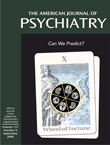Depression in Schizophrenia: Perspective in the Era of “Atypical” Antipsychotic Agents
Abstract
OBJECTIVE: The author sought to provide a contemporary understanding of depression in schizophrenia and promote a treatment orientation. METHOD: Computer and library-based resources were used to review the literature on depression in schizophrenia. RESULTS: Despite multiple definitions of “depression,” a substantial rate of depression has consistently been found in patients with schizophrenia. A differential diagnosis can be used to advance the understanding and treatment of depression in schizophrenia, and changes in response to the advent of atypical antipsychotic agents can be understood in the context of this differential diagnosis paradigm. CONCLUSIONS: Depression is an important co-occurring syndrome in schizophrenia. In at least some schizophrenic patients, the stress-vulnerability model has potential as an integrating concept concerning the relationship between depression and psychosis.



